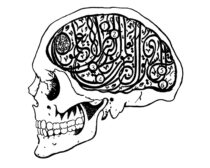Morocco
Rilka Spieler & Christine Villanueva
mounir fatmi was born in 1970 in Tangier, Morocco and now lives and works in Paris. fatmi’s artistic practice encompasses a wide range of media including video, installation, photography, painting, and drawing. His works often attempt to relocate and reinterpret an Islamic aesthetic and political legacy. From the kinetic power of circular band saws incised with Arabic calligraphy to an installation piece comprised of VHS tapes and stacked books that casts a shadow of the Manhattan skyline (including the Twin Towers), fatmi interrogates identity, language, capitalism, media, and technology. He has attracted attention in recent years for his installations, selected for the 2007 and 2009 Venice Bienniales, and he has participated in exhibitions at the Centre Georges Pompidou, The Brooklyn Museum, and the Moscow Museum of Modern Art, to name a few.
fatmi often confronts the perceptions and representations that form viewers’ notions of ‘Islamic’ and secular identities. Calligraphy has served as a major element in fatmi’s works. In Hard Head, a mural painting of a human skull, the artist paints the ornate characters of Arabic calligraphy in place of the crevices and curvatures of the human brain, the interlaced script encompassing the numbers one to six. Drawn in profile, Hard Head references phrenology, 1 which links the brain with the human spirit and individual character traits. Hard Head challenges the conditions of subjectivity and cultural awareness of two audiences—those who know Arabic and those who don’t. The former can loosely transcribe the script from an excerpt from the Qur’an: “Do they look alike, those who know and those who do not?” 2 For those who are unable to translate, the Arabic calligraphy serves only as a mysterious decorative device. fatmi investigates these boundaries of knowledge, challenging viewers to confront contemporary conceptions of identity.
fatmi’s recent video History is not mine is a direct response to the censorship of two of his videos in France. This five-minute video features two hands holding hammers that are pounding away at a typewriter. As an explicit critique of censorship, fatmi’s work calls to mind the famous Winston Churchill quote: “History is written by the victors.” In this video, the person attempting to type at the typewriter with hammers is clearly ill equipped to do so, and, as such, his actions will be obscured from the written word. While the entire video is filmed in black and white, the ink ribbon is bright red, suggesting that the text is being written in blood, a reminder of the blood shed during the struggle between the colonized and colonizer.
- Evelyne Toussaint, “Tête dure/Le Cogito de Mounir Fatmi,” Mounir Fatmi Hard Head, 45-50. Rijksakademie van beeldende kunsten, 2006. ↑
- mounir fatmi, interview by Christophe Gallois, http://metropolism.com/magazine/2008-no6/wie-zijn-de-wetenden/, December 20, 2008. ↑


